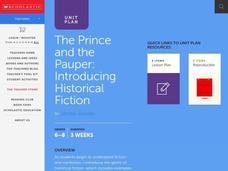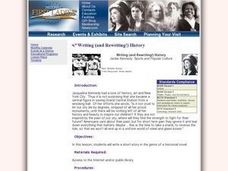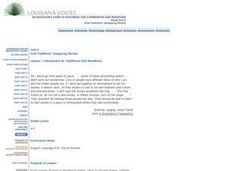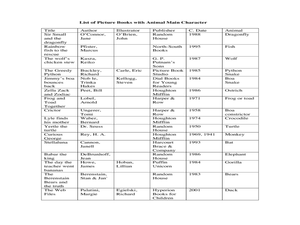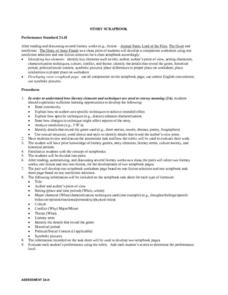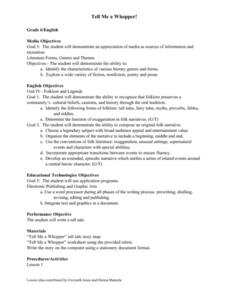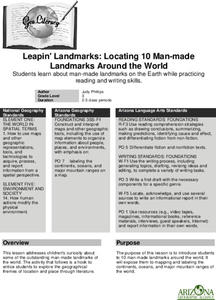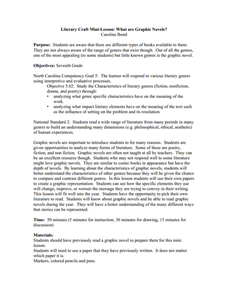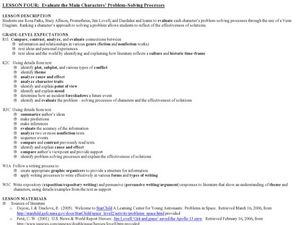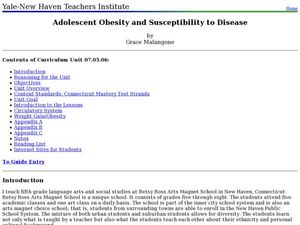Curated OER
The Prince and the Pauper
Mark Twain, the famous American author, is often studied in the school system. Use "The Prince and the Pauper" to analyze the differences between the text and its video version. This lesson includes several culminating project...
National First Ladies' Library
Writing (and Rewriting!) History
Middle schoolers differentiate between fiction and non-fiction, discuss historical fiction, which combines both genres, choose historical novel from list and read independently, and write original short stories that combine elements of...
Curated OER
Introduction to Traditional Oral Narratives
Students are introduced to the idea of traditional oral narratives and divide them into genres. They explore the genres of context, motifs and variants. Each student finds oral narratives in their own lives and practice retelling them in...
Curated OER
Find an Animal! Find a Book!
Students identify the themes of different books by classifying their genre. In this genre lesson plan, students examine a specific animal by reading both a nonfiction and fiction book about the species. Students compare the...
Curated OER
Understanding Genres
Young scholars identify genres of literature. In this literature instructional activity, students read definitions of the various genres. Young scholars choose books and list clues in the texts that help them identify the appropriate genre.
Curated OER
What Genre Am I?
First graders differentiate between different pieces of literary genres by participating in a hands-on activity. This includes a student assessment sheet.
Curated OER
What is a Biography?
Investigate biographies with your class. Compare autobiographies and biographies of Martin Luther King, Jr. as an example. Learners explore the factual components that make up a biography and locate several biographies of notable...
Curated OER
Lesson 3: Encyclopedias
After being introduced to non-fiction texts, second graders meet a different type of non-fiction text that can help them locate factual information. They discuss and examine all of the features found in typical encyclopedias such...
Curated OER
Library Curriculum: What Would a Wonderful Library Be Like?
Second graders complete a KWL chart about libraries. They create a book using writing patterns of a particular author. Students decide criteria for awarding the Second Grade Librarian Award to books in the classroom library, and use a...
Curated OER
Go For The Gold!
Third graders read fiction and nonfiction works for comprehension. Using the internet, 3rd graders participate in a WebQuest. They compare and contrast the Olympics in ancient Greece to the modern day Olympics. Afterwards, students...
Curated OER
Story Scrapbook
Students develop a comparison worksheet using one non fiction book and one fiction book they have read to be put into a class scrapbook. In their comparison students must have title, author, point of view, setting, characters, and other...
Curated OER
Evaluate Problem-Solving in the Context of Culture and Time-frame
Students examine literary elements in non-fiction literature. In this problem solving lesson, students read Rosa Parks, My Story and Beyond the Limits. Students make oral presentations based on the causes and effects, conflicts, and...
Curated OER
Researching Using Books
Young scholars investigate researching techniques by exploring their library. In this literature references activity, students identify the different types and genres of books that are readily available at their local library as well as...
Curated OER
Tell Me a Whopper!
Sixth graders investigate tall tales as a literary genre. They listen to a number of tall tales to discover how exaggeration is used as a story element. They write and publish a tall tale using word processing software. They illustrate...
Curated OER
Pizzeria (reading Encouragement)
Students create a pizzeria atmosphere in the classroom with Italian music, pizza menus and checkered table cloths. They compare their different tastes in pizza toppings to different tastes in reading. Then they use a reading menu to...
Curated OER
Creating and Presenting Haiku with Kid Pix
Third graders research what a Haiku is and be able to answer related questions on an example of a Haiku. They create an original Haiku of their own using general Haiku characteristic guidelines. Students use Kid Pix to type in and...
Curated OER
Kumeyaay Indians
Useful for literary analysis, citing textual evidence, or summary skills, this lesson about the Kumeyaay Indians would be a good addition to your language arts class. Middle schoolers read novels and summarize the literature in their own...
Curated OER
Leapin' Landmarks: Locating 10 man-made landmarks around the world
Third graders engage in a lesson which addresses their curiosity about some of the outstanding people-made landmarks of the world. They explore the geographical themes of location and place through literature.
Curated OER
William Apess and the Mashpee "Revolt" of 1833
Prompt your class with the following question: What was the status of American Indians in Massachusetts during Jackson's presidency? To answer this question, class members will read a series of primary source documents (attached),...
Appalachian State University
What Are Graphic Novels?
To do this engaging and pleasurable activity, your learners should have already read a graphic novel, and produced a piece of writing that can be reproduced into the format of a graphic novel. This exercise provides a script that...
Curated OER
Review Steps in the Writing Process and Explore a Poem
Students practice their persuasive writing skills. In this writing process lesson, students write essays that meet the requirements of the included text element worksheets and analyze poetry of their choosing.
Curated OER
Evaluate the Main Characters? Problem-Solving Processes
High schoolers read passages from several sources and evaluate the text for various criteria. In this problem solving lesson, students evaluate character problem solving processes after reading passages. They will use a Venn Diagram to...
Curated OER
Adolescent Obesity and Susceptibility to Disease
Students understand the importance of maintaining a healthy weight and good health. In this health instructional activity students read text then create their own pamphlet on the cardiovascular system, weight gain, treatments and...
Curated OER
Rural Voices Through Photography
Students research the history of the Depression particularly in the ways it was documented by photography. Then they take their own pictures in the style of one of the best documentarians, Dorothea Lange.
